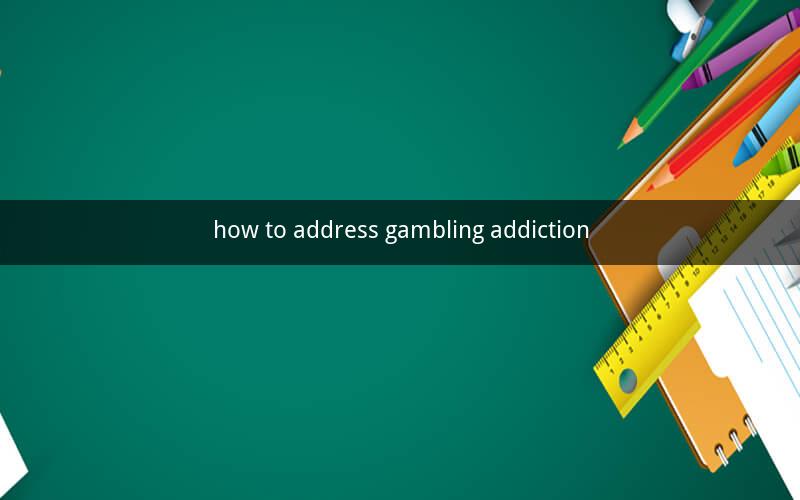
Contents
1. Introduction to Gambling Addiction
2. Understanding the Signs of Gambling Addiction
3. Causes of Gambling Addiction
4. The Impact of Gambling Addiction on Individuals and Society
5. Strategies to Address Gambling Addiction
6. Treatment Options for Gambling Addiction
7. Support Systems for Gambling Addiction
8. Preventing Gambling Addiction
9. Conclusion
Introduction to Gambling Addiction
Gambling addiction, also known as problem gambling or compulsive gambling, is a serious condition characterized by an inability to control or stop gambling despite negative consequences. It affects millions of individuals worldwide, causing significant harm to their personal, social, and financial well-being. Addressing gambling addiction is crucial for the recovery and well-being of those affected and for the overall health of society.
Understanding the Signs of Gambling Addiction
Recognizing the signs of gambling addiction is the first step towards addressing the issue. Common signs include:
- Increased time spent gambling
- Preoccupation with gambling
- Feeling restless or irritable when unable to gamble
- Increasing stakes to maintain excitement
- Continuously chasing losses
- Borrowing money or selling possessions to fund gambling
- Lying about gambling activities
- Risking or losing a significant amount of money
Causes of Gambling Addiction
Several factors contribute to the development of gambling addiction, including:
- Genetic predisposition: Some individuals may have a genetic vulnerability to addiction.
- Environmental factors: Exposure to gambling opportunities, marketing, and societal attitudes towards gambling can contribute to addiction.
- Psychological factors: Stress, anxiety, and other mental health issues may trigger or exacerbate gambling behavior.
- Social factors: Peer pressure, social isolation, and the desire for acceptance can contribute to the development of gambling addiction.
The Impact of Gambling Addiction on Individuals and Society
Gambling addiction has far-reaching consequences for individuals and society:
- Personal consequences: Individuals may experience financial ruin, relationship problems, legal issues, and a decline in physical and mental health.
- Family consequences: Families may suffer emotional and financial strain due to the addicted individual's behavior.
- Societal consequences: Gambling addiction can lead to increased crime rates, public health problems, and economic losses.
Strategies to Address Gambling Addiction
Several strategies can be used to address gambling addiction:
- Education and awareness: Educating individuals about the risks and consequences of gambling can help prevent addiction.
- Cognitive-behavioral therapy: This type of therapy helps individuals recognize and change harmful thoughts and behaviors related to gambling.
- Medication: Certain medications may help reduce the urge to gamble or alleviate associated symptoms.
- Support groups: Joining a support group can provide individuals with a sense of community and accountability.
- Self-help strategies: Individuals can develop strategies to resist the urge to gamble, such as avoiding triggers and setting strict boundaries.
Treatment Options for Gambling Addiction
Treatment for gambling addiction can vary depending on the individual's needs and circumstances. Common treatment options include:
- Inpatient treatment: Individuals live at a treatment facility while receiving intensive care and support.
- Outpatient treatment: Individuals receive treatment while living at home, allowing for greater flexibility.
- Residential treatment: A combination of inpatient and outpatient treatment, providing a structured environment with support from professionals and peers.
- Therapy: Individual, group, or family therapy can help individuals address underlying issues contributing to their gambling addiction.
Support Systems for Gambling Addiction
Support systems are essential for individuals struggling with gambling addiction:
- Therapists: Professional therapists can provide personalized support and treatment.
- Counselors: Counselors can offer guidance and support for individuals and families affected by gambling addiction.
- Support groups: Peer support groups, such as Gamblers Anonymous, provide a sense of community and accountability.
- Family members: Family members can play a crucial role in supporting the addicted individual's recovery.
Preventing Gambling Addiction
Preventing gambling addiction involves several strategies:
- Setting limits: Establishing a budget and time limits for gambling can help individuals stay in control.
- Avoiding high-risk environments: Steer clear of gambling venues and websites that may trigger gambling behavior.
- Staying informed: Educate oneself about the risks and consequences of gambling.
- Seeking help: If gambling becomes problematic, seek help from professionals or support groups.
Conclusion
Addressing gambling addiction requires a multifaceted approach involving education, treatment, support, and prevention. By recognizing the signs of addiction, seeking help, and implementing strategies to prevent relapse, individuals can overcome gambling addiction and improve their quality of life.
Questions and Answers
1. What are the signs of gambling addiction?
2. What causes gambling addiction?
3. How does gambling addiction affect individuals and society?
4. What are the treatment options for gambling addiction?
5. How can family members support someone with gambling addiction?
6. What are some self-help strategies for gambling addiction?
7. How can I prevent gambling addiction?
8. What is the role of therapy in treating gambling addiction?
9. How can I find a support group for gambling addiction?
10. What are the consequences of not treating gambling addiction?